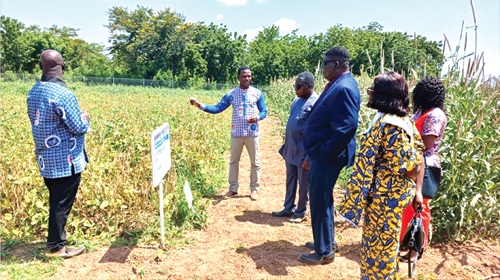For the past decade, farmers across northern Ghana have been grappling with the harsh realities of climate change, such as unpredictable rainfall, prolonged droughts, rising temperatures and declining soil fertility.
These disruptions have shaken conventional farming calendars and pushed many smallholder farmers into recurring cycles of food insecurity.
The northern savanna zone encompassing the Northern, Savannah, Upper East, Upper West and North East regions, though the food basket of the country is the most climate-stressed zone.
According to the Ghana Meteorological Agency (GMeT), average annual rainfall in northern Ghana has declined by nearly 20 per cent over the past three decades.
With over 75 per cent of farms depending solely on rainfall, even small shifts in climate patterns can have devastating consequences.
It is estimated that in 2024 alone, prolonged dry spells affected 460,000 hectares, which is about 60 per cent of cultivated land in the Northern Region, while the entire northern belt lost an estimated 1.8 million hectares of farmland to drought, costing farmers more than GH¢22.2 billion in crop losses.
Science-driven response
To address these challenges, the Council for Scientific and Industrial Research–Savanna Agricultural Research Institute (CSIR-SARI), in collaboration with the West and Central African Council for Agricultural Research and Development (CORAF) and other partners, established a technology park in Nyankpala.
![]()
Some improved varieties planted in the technology park for exhibition to farmers and general public
Established in 2024, the park serves as an exhibition and learning hub for sustainable, climate-smart, gender and nutrition-sensitive agricultural innovations. It has launched about 74 new technologies across 10 different crops, making them available to farmers, researchers and agribusiness stakeholders.
Among these innovations are drought-tolerant, high-oleic groundnuts (SARINUT 7 and 8), fall armyworm-tolerant maize hybrids (CSIR-SARIMAZ and CSIR-Wobil Moya), provitamin A-enriched maize hybrid (CSIR-Abebe), and a pod-borer resistant cowpea variety (Songotra-T) developed through biotechnology.
Other showcased technologies include mechanised planters and harvesters, seed-multiplication systems, striga-control methods, drip irrigation, integrated soil-fertility management, and the System of Rice Intensification (SRI), which applies four core principles: composting to enrich soil, transplanting young seedlings (14–15 days old), line planting to ease mechanised weeding and alternating wetting and drying to conserve water.
Learning platform
In an interview during a tour of the park last Wednesday, the Director of CSIR-SARI, Dr Francis Kusi, said the park had become a platform for farmers, students and extension agents eager to learn and adopt the new technologies.
He explained that all the research and new varieties developed by the council had been showcased in the field for better appreciation and adoption by actors in the agricultural value chain.
“Every day, we receive visitors from across the country who come to learn how these innovations work,” he said.
Dr Kusi added that “these hands-on experiences are vital; they help farmers understand how to apply technologies such as drought-tolerant maize, improved soybean and early-maturing rice varieties.
The idea is linking knowledge, innovation and practice for sustainable development.”
Boosting agriculture
The Director-General of CSIR, Professor Paul P. Bosu, described the technology park as revolutionary, noting that it was transforming agricultural research into real-world applications.
“The technology park is revolutionising agriculture in the north and beyond; for the first time, we are seeing our research outputs directly transferred into the hands of farmers.
We are moving from the laboratory to the field and turning scientific innovation into livelihood improvement,” he stated.
He added that CSIR’s mission was not just to conduct research, but to ensure that scientific breakthroughs benefit farmers and communities directly.
The Council Chairman of CSIR, Mark A. Taylor, lauded CSIR-SARI for its pioneering role in transforming agriculture in the north, but urged sustained support to expand the initiative.
He, therefore, called for increased funding and investment to enable them scale up and commercialise the technologies nationwide.
“We must support CSIR with the resources it needs to expand these innovations because agricultural research is the foundation of food security and national development. Investing in it means investing in our future,” he stressed.
Experiences
A 42-year-old farmer from Nyankpala, Salamatu Alhassan, said before she visited the park, her groundnut yield kept dropping because the rain was always failing her but “after learning about the improved variety, I planted it last season and even though the rains delayed, I harvested more than double what I used to get.”
Similarly, a 29-year-old farmer from Tolon, Fuseini Yakubu, said the park had renewed his interest in agriculture.
“I was planning to stop farming because of losses, but when I visited Nyankpala, I saw new ways of planting maize using less water and better spacing.
“Now I use the SRI method for rice and drip irrigation for vegetables. My friends didn’t believe it until they saw the results,” he added.
Despite its success, the park faces challenges, notably in sustainable financing to maintain and scale up its innovations.
With the right support, it can evolve into a regional centre of excellence for climate-resilient agriculture across West Africa.
Writer’s email: mohammed.fugu@graphic.com.gh

